人教版(2019)必修第三册Unit 2 Morals and Virtues Listening and Talking课件 (共21张PPT,内嵌视频)
文档属性
| 名称 | 人教版(2019)必修第三册Unit 2 Morals and Virtues Listening and Talking课件 (共21张PPT,内嵌视频) | 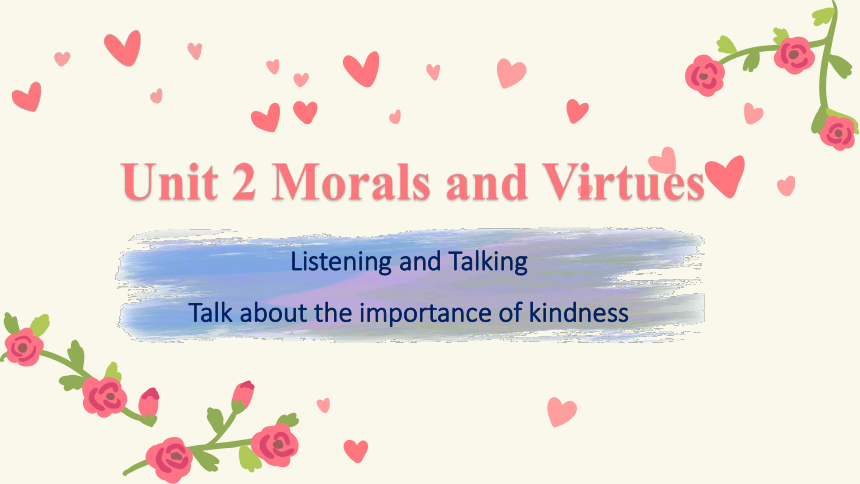 | |
| 格式 | pptx | ||
| 文件大小 | 55.1MB | ||
| 资源类型 | 教案 | ||
| 版本资源 | 人教版(2019) | ||
| 科目 | 英语 | ||
| 更新时间 | 2024-05-22 16:11:31 | ||
图片预览

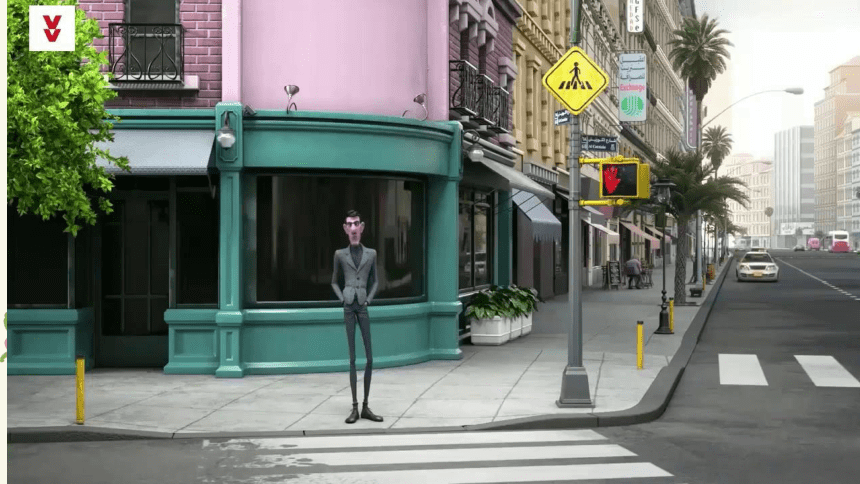
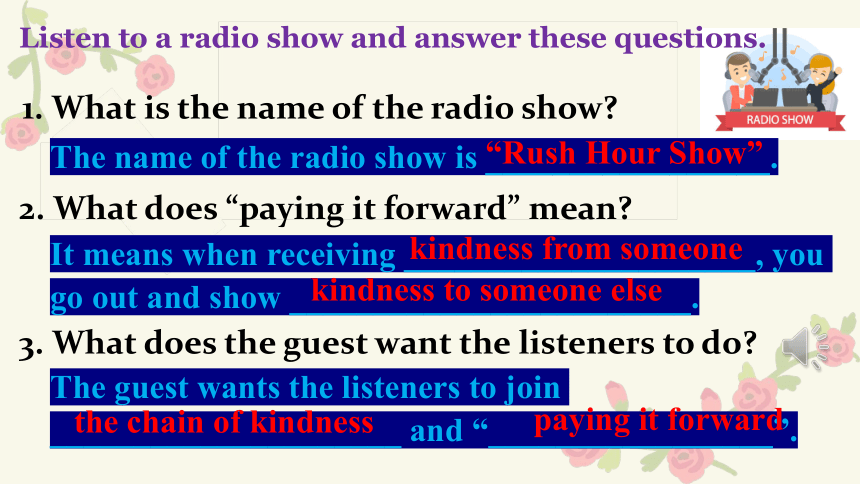
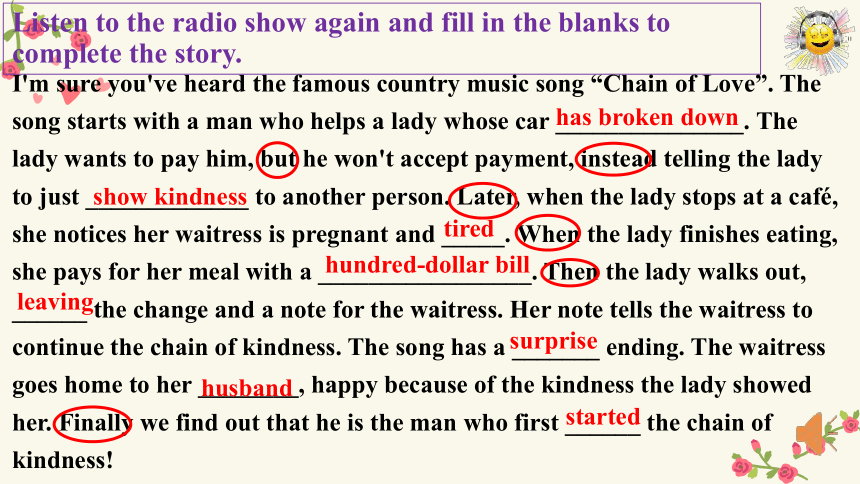
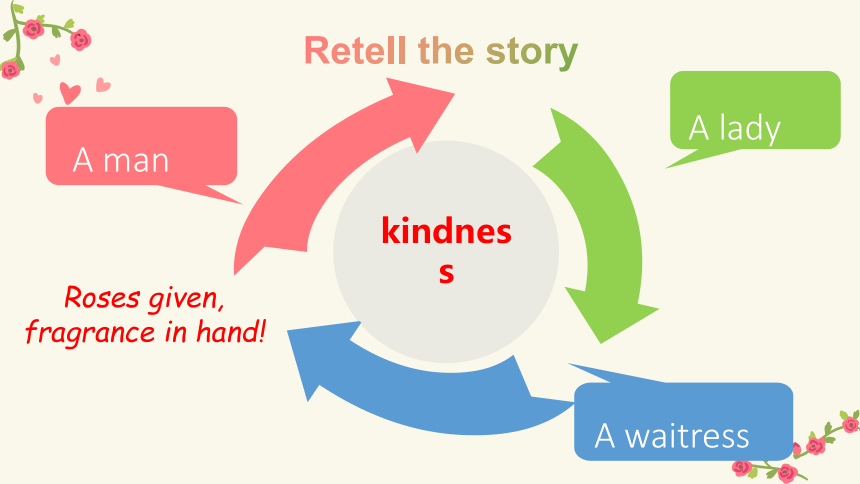
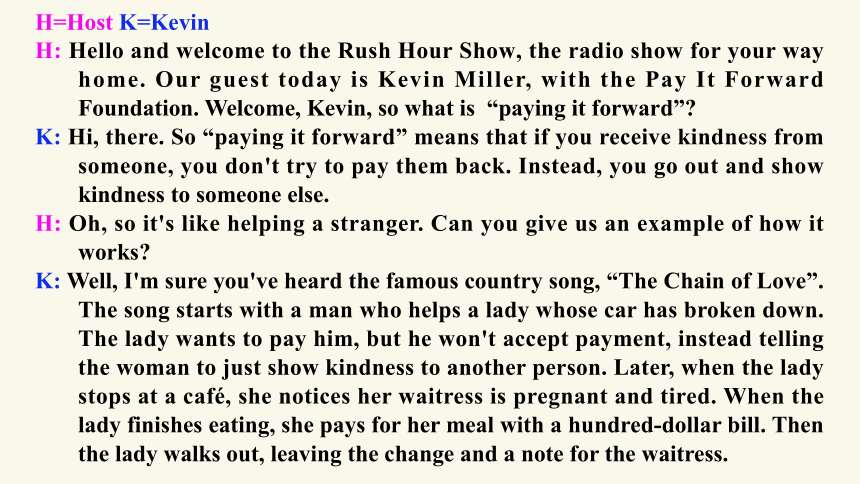
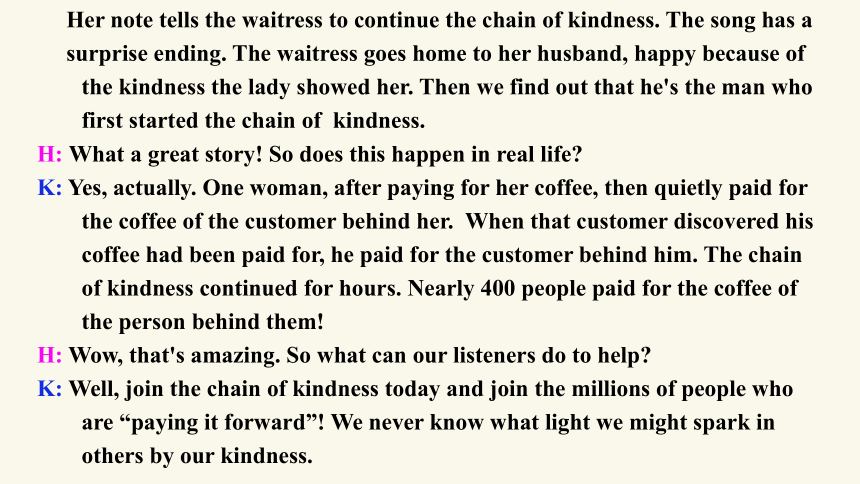

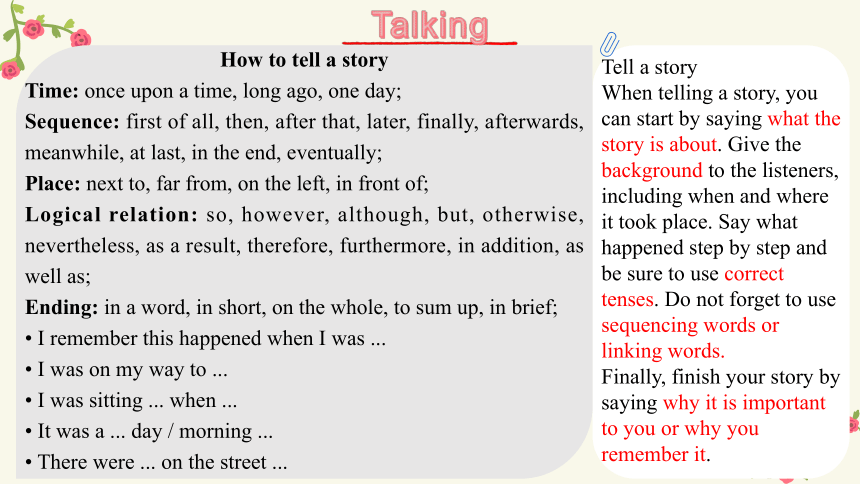
文档简介
(共21张PPT)
Unit 2 Morals and Virtues
Listening and Talking
Talk about the importance of kindness
The guest wants the listeners to join _____________________ and “_________________”.
It means when receiving _____________________, you go out and show ________________________.
The name of the radio show is _________________.
kindness from someone
kindness to someone else
the chain of kindness
paying it forward
Listen to a radio show and answer these questions.
1. What is the name of the radio show
2. What does “paying it forward” mean
3. What does the guest want the listeners to do
“Rush Hour Show”
Listen to the radio show again and fill in the blanks to complete the story.
I'm sure you've heard the famous country music song “Chain of Love”. The song starts with a man who helps a lady whose car _______________. The lady wants to pay him, but he won't accept payment, instead telling the lady to just _____________ to another person. Later, when the lady stops at a café, she notices her waitress is pregnant and _____. When the lady finishes eating, she pays for her meal with a _________________. Then the lady walks out, ______ the change and a note for the waitress. Her note tells the waitress to continue the chain of kindness. The song has a _______ ending. The waitress goes home to her ________, happy because of the kindness the lady showed her. Finally we find out that he is the man who first ______ the chain of kindness!
has broken down
show kindness
tired
hundred-dollar bill
leaving
surprise
husband
started
kindness
A man
Retell the story
A lady
A waitress
Roses given,
fragrance in hand!
H=Host K=Kevin
H: Hello and welcome to the Rush Hour Show, the radio show for your way home. Our guest today is Kevin Miller, with the Pay It Forward Foundation. Welcome, Kevin, so what is “paying it forward”
K: Hi, there. So “paying it forward” means that if you receive kindness from someone, you don't try to pay them back. Instead, you go out and show kindness to someone else.
H: Oh, so it's like helping a stranger. Can you give us an example of how it works
K: Well, I'm sure you've heard the famous country song, “The Chain of Love”. The song starts with a man who helps a lady whose car has broken down. The lady wants to pay him, but he won't accept payment, instead telling the woman to just show kindness to another person. Later, when the lady stops at a café, she notices her waitress is pregnant and tired. When the lady finishes eating, she pays for her meal with a hundred-dollar bill. Then the lady walks out, leaving the change and a note for the waitress.
Her note tells the waitress to continue the chain of kindness. The song has a
surprise ending. The waitress goes home to her husband, happy because of the kindness the lady showed her. Then we find out that he's the man who first started the chain of kindness.
H: What a great story! So does this happen in real life
K: Yes, actually. One woman, after paying for her coffee, then quietly paid for the coffee of the customer behind her. When that customer discovered his coffee had been paid for, he paid for the customer behind him. The chain of kindness continued for hours. Nearly 400 people paid for the coffee of the person behind them!
H: Wow, that's amazing. So what can our listeners do to help
K: Well, join the chain of kindness today and join the millions of people who are “paying it forward”! We never know what light we might spark in others by our kindness.
Clay Walker - The Chain Of Love
Talking
How to tell a story
Time: once upon a time, long ago, one day;
Sequence: first of all, then, after that, later, finally, afterwards, meanwhile, at last, in the end, eventually;
Place: next to, far from, on the left, in front of;
Logical relation: so, however, although, but, otherwise, nevertheless, as a result, therefore, furthermore, in addition, as well as;
Ending: in a word, in short, on the whole, to sum up, in brief;
I remember this happened when I was ...
I was on my way to ...
I was sitting ... when ...
It was a ... day / morning ...
There were ... on the street ...
Tell a story
When telling a story, you can start by saying what the story is about. Give the background to the listeners, including when and where it took place. Say what happened step by step and be sure to use correct tenses. Do not forget to use sequencing words or linking words.
Finally, finish your story by saying why it is important to you or why you remember it.
Think of a story of showing or receiving kindness, either your own story or one that you have heard of. Then share it with your group.
Once, I did not have money to go to university, and so someone paid my tuition that term. This happened when I was eighteen. My grandmother had just died, and this had caused my family great expense, so we had no extra money at all. I did everything I could to raise the money, but it seemed hopeless. Then the morning that the tuition was due, someone gave my mother an envelope with the money. It wasn’t their money, and they wouldn’t say who it was from. It seems that some stranger had heard about my money problem and decided to help. This meant so much to me, as without it I would not have been able to go to university.
Sample Answer
shape
■ n [C] & [U] 形状;外形:
Although all kites have a similar structure, they are widely different in size and shape.
For my fifth birthday, my mother baked me a cake in the shape of a monkey. 2020 天津
【常用搭配】
get (oneself) into shape 强身健体:
I’ve got to get into shape before summer.
in good / bad shape 身体健康 / 不健康;状态好 / 不好:
He’s in good shape for a man of his age.
The economy is in very bad shape and is likely to get worse.
in shape 健康状况好:
She jogs for an hour every morning to keep / stay in shape.
out of shape 变形;身体不健康:
The front wheel of the bicycle was out of shape.
I hadn’t been training for months and was really out of shape.
take shape 形成;使成形:
An idea was beginning to take shape in his mind.
■ vt
使成形:
an L-shaped sofa
Italy shaped like a boot lies in the south of Europe.
影响 / 决定 (事物的发展):
It’s not what we do once in a while that shapes our lives, but what we do consistently.
shape up [非正式用语] 改进 (行为 / 工作):
If he doesn’t shape up, he’ll soon be out of a job.
名词动词化
account
account源自古法语,由“ac-(加强意义)+ -count(计数)”构成,account的词源义是“计数”,其基本义是“记录”。 “计数”本质上就是 “记录”。
在文字发明以前,为了适应表达和记忆的需要,人类用“刻道计数”和“结绳记事”等方法来计数或记录事件。
account
n [C]
[常用复数] 账;账目:
an account book
He takes care of the business and his wife keeps the accounts.
账户;账号:
open / close an account
have an account at / with a bank
the WeChat official / public account
My father helped me set up a bank account.
叙述;报道;描写:
an eye-witness account of a murder
a brief account of a trip 2020 新课标
While this book tells the stories of famous people in history, it also gives an account of the lives of lesser-known individuals. 2017 江苏改
account语义网络
记录
(基本义)
资金往来的“记录”
进行银行交易、使用网络等时个人信息的“记录”
账;账目
账户;账号
事件的“记录”
叙述;报道;描写
on account of 因为;由于 (because of):
She was absent from school on account of illness.
on no account 决不;绝对不:
The professor warned the students that on no account should they use mobile phones in his class. 2019 天津
take account of / take ... into account 考虑到;把……考虑进去:
The company takes account of environmental issues wherever possible.
One must take the audience into account when making speeches.
重要搭配
注:on no account置于句首,其所在的句子要用倒装语序。
account for v
(数量、比例上)占:
Lighting accounts for about 7% of the total electricity consumed in the US. 2020 全国
是……的原因;解释 / 说明 (explain):
The application of new technologies and wide appeal of movie stars could account for the increase of the box office income. 2017 江苏书面表达改
词汇拓展
accountant n [C] 会计 (员);会计师
本单元金句汇总
1. She jogs for an hour every morning to keep / stay in shape.
2. It’s not what we do once in a while that shapes our lives, but what we do consistently.
3. While this book tells the stories of famous people in history, it also gives an account of the lives of lesser-known individuals. 2017 江苏改
4. She was absent from school on account of illness.
Unit 2 Morals and Virtues
Listening and Talking
Talk about the importance of kindness
The guest wants the listeners to join _____________________ and “_________________”.
It means when receiving _____________________, you go out and show ________________________.
The name of the radio show is _________________.
kindness from someone
kindness to someone else
the chain of kindness
paying it forward
Listen to a radio show and answer these questions.
1. What is the name of the radio show
2. What does “paying it forward” mean
3. What does the guest want the listeners to do
“Rush Hour Show”
Listen to the radio show again and fill in the blanks to complete the story.
I'm sure you've heard the famous country music song “Chain of Love”. The song starts with a man who helps a lady whose car _______________. The lady wants to pay him, but he won't accept payment, instead telling the lady to just _____________ to another person. Later, when the lady stops at a café, she notices her waitress is pregnant and _____. When the lady finishes eating, she pays for her meal with a _________________. Then the lady walks out, ______ the change and a note for the waitress. Her note tells the waitress to continue the chain of kindness. The song has a _______ ending. The waitress goes home to her ________, happy because of the kindness the lady showed her. Finally we find out that he is the man who first ______ the chain of kindness!
has broken down
show kindness
tired
hundred-dollar bill
leaving
surprise
husband
started
kindness
A man
Retell the story
A lady
A waitress
Roses given,
fragrance in hand!
H=Host K=Kevin
H: Hello and welcome to the Rush Hour Show, the radio show for your way home. Our guest today is Kevin Miller, with the Pay It Forward Foundation. Welcome, Kevin, so what is “paying it forward”
K: Hi, there. So “paying it forward” means that if you receive kindness from someone, you don't try to pay them back. Instead, you go out and show kindness to someone else.
H: Oh, so it's like helping a stranger. Can you give us an example of how it works
K: Well, I'm sure you've heard the famous country song, “The Chain of Love”. The song starts with a man who helps a lady whose car has broken down. The lady wants to pay him, but he won't accept payment, instead telling the woman to just show kindness to another person. Later, when the lady stops at a café, she notices her waitress is pregnant and tired. When the lady finishes eating, she pays for her meal with a hundred-dollar bill. Then the lady walks out, leaving the change and a note for the waitress.
Her note tells the waitress to continue the chain of kindness. The song has a
surprise ending. The waitress goes home to her husband, happy because of the kindness the lady showed her. Then we find out that he's the man who first started the chain of kindness.
H: What a great story! So does this happen in real life
K: Yes, actually. One woman, after paying for her coffee, then quietly paid for the coffee of the customer behind her. When that customer discovered his coffee had been paid for, he paid for the customer behind him. The chain of kindness continued for hours. Nearly 400 people paid for the coffee of the person behind them!
H: Wow, that's amazing. So what can our listeners do to help
K: Well, join the chain of kindness today and join the millions of people who are “paying it forward”! We never know what light we might spark in others by our kindness.
Clay Walker - The Chain Of Love
Talking
How to tell a story
Time: once upon a time, long ago, one day;
Sequence: first of all, then, after that, later, finally, afterwards, meanwhile, at last, in the end, eventually;
Place: next to, far from, on the left, in front of;
Logical relation: so, however, although, but, otherwise, nevertheless, as a result, therefore, furthermore, in addition, as well as;
Ending: in a word, in short, on the whole, to sum up, in brief;
I remember this happened when I was ...
I was on my way to ...
I was sitting ... when ...
It was a ... day / morning ...
There were ... on the street ...
Tell a story
When telling a story, you can start by saying what the story is about. Give the background to the listeners, including when and where it took place. Say what happened step by step and be sure to use correct tenses. Do not forget to use sequencing words or linking words.
Finally, finish your story by saying why it is important to you or why you remember it.
Think of a story of showing or receiving kindness, either your own story or one that you have heard of. Then share it with your group.
Once, I did not have money to go to university, and so someone paid my tuition that term. This happened when I was eighteen. My grandmother had just died, and this had caused my family great expense, so we had no extra money at all. I did everything I could to raise the money, but it seemed hopeless. Then the morning that the tuition was due, someone gave my mother an envelope with the money. It wasn’t their money, and they wouldn’t say who it was from. It seems that some stranger had heard about my money problem and decided to help. This meant so much to me, as without it I would not have been able to go to university.
Sample Answer
shape
■ n [C] & [U] 形状;外形:
Although all kites have a similar structure, they are widely different in size and shape.
For my fifth birthday, my mother baked me a cake in the shape of a monkey. 2020 天津
【常用搭配】
get (oneself) into shape 强身健体:
I’ve got to get into shape before summer.
in good / bad shape 身体健康 / 不健康;状态好 / 不好:
He’s in good shape for a man of his age.
The economy is in very bad shape and is likely to get worse.
in shape 健康状况好:
She jogs for an hour every morning to keep / stay in shape.
out of shape 变形;身体不健康:
The front wheel of the bicycle was out of shape.
I hadn’t been training for months and was really out of shape.
take shape 形成;使成形:
An idea was beginning to take shape in his mind.
■ vt
使成形:
an L-shaped sofa
Italy shaped like a boot lies in the south of Europe.
影响 / 决定 (事物的发展):
It’s not what we do once in a while that shapes our lives, but what we do consistently.
shape up [非正式用语] 改进 (行为 / 工作):
If he doesn’t shape up, he’ll soon be out of a job.
名词动词化
account
account源自古法语,由“ac-(加强意义)+ -count(计数)”构成,account的词源义是“计数”,其基本义是“记录”。 “计数”本质上就是 “记录”。
在文字发明以前,为了适应表达和记忆的需要,人类用“刻道计数”和“结绳记事”等方法来计数或记录事件。
account
n [C]
[常用复数] 账;账目:
an account book
He takes care of the business and his wife keeps the accounts.
账户;账号:
open / close an account
have an account at / with a bank
the WeChat official / public account
My father helped me set up a bank account.
叙述;报道;描写:
an eye-witness account of a murder
a brief account of a trip 2020 新课标
While this book tells the stories of famous people in history, it also gives an account of the lives of lesser-known individuals. 2017 江苏改
account语义网络
记录
(基本义)
资金往来的“记录”
进行银行交易、使用网络等时个人信息的“记录”
账;账目
账户;账号
事件的“记录”
叙述;报道;描写
on account of 因为;由于 (because of):
She was absent from school on account of illness.
on no account 决不;绝对不:
The professor warned the students that on no account should they use mobile phones in his class. 2019 天津
take account of / take ... into account 考虑到;把……考虑进去:
The company takes account of environmental issues wherever possible.
One must take the audience into account when making speeches.
重要搭配
注:on no account置于句首,其所在的句子要用倒装语序。
account for v
(数量、比例上)占:
Lighting accounts for about 7% of the total electricity consumed in the US. 2020 全国
是……的原因;解释 / 说明 (explain):
The application of new technologies and wide appeal of movie stars could account for the increase of the box office income. 2017 江苏书面表达改
词汇拓展
accountant n [C] 会计 (员);会计师
本单元金句汇总
1. She jogs for an hour every morning to keep / stay in shape.
2. It’s not what we do once in a while that shapes our lives, but what we do consistently.
3. While this book tells the stories of famous people in history, it also gives an account of the lives of lesser-known individuals. 2017 江苏改
4. She was absent from school on account of illness.
